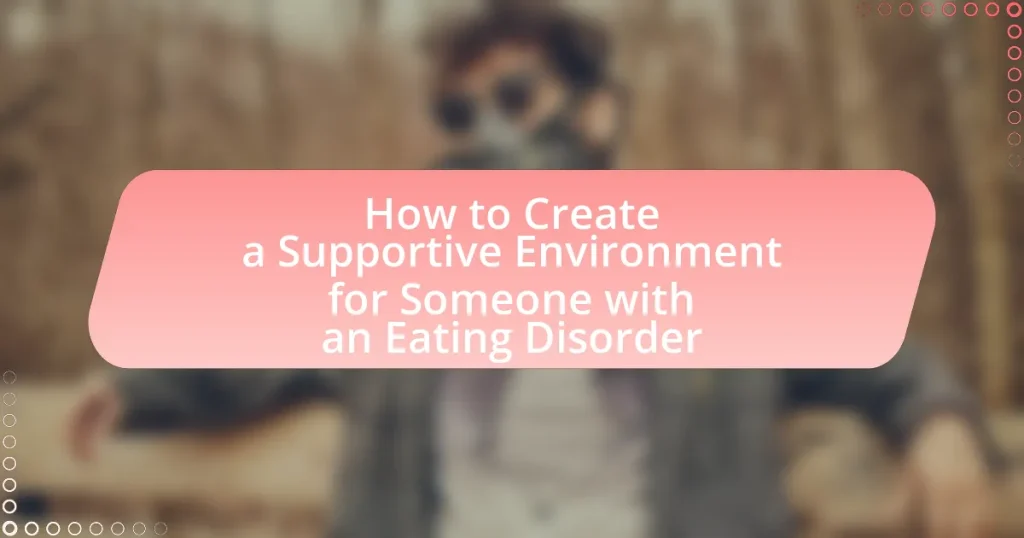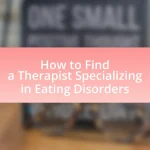Creating a supportive environment for someone with an eating disorder involves fostering understanding, compassion, and open communication. Key elements include empathy, non-judgmental attitudes, and active listening, which significantly enhance recovery outcomes. Research highlights the importance of emotional support from family and friends, as well as the role of professional resources such as therapy and nutrition counseling. The article outlines practical strategies for families and friends to provide meaningful support, avoid enabling behaviors, and celebrate small victories in recovery, ultimately promoting a nurturing atmosphere essential for healing.

What does it mean to create a supportive environment for someone with an eating disorder?
Creating a supportive environment for someone with an eating disorder means fostering a space that promotes understanding, compassion, and open communication. This involves actively listening to their feelings, avoiding judgmental comments about food or body image, and encouraging professional help when necessary. Research indicates that a supportive atmosphere can significantly enhance recovery outcomes, as individuals feel safer to express their struggles and seek assistance. For instance, a study published in the Journal of Eating Disorders highlights that emotional support from family and friends is crucial in the recovery process, demonstrating that a nurturing environment can lead to improved mental health and well-being.
Why is a supportive environment crucial for recovery?
A supportive environment is crucial for recovery because it fosters emotional safety and encourages positive behavioral changes. Research indicates that individuals recovering from eating disorders benefit significantly from social support, which can enhance motivation and resilience. For instance, a study published in the Journal of Eating Disorders found that patients with strong social networks experienced lower relapse rates and improved treatment outcomes. This highlights the importance of a nurturing atmosphere that promotes understanding, empathy, and open communication, all of which are essential for effective recovery from eating disorders.
What psychological benefits does a supportive environment provide?
A supportive environment provides significant psychological benefits, including enhanced emotional well-being, reduced anxiety, and improved self-esteem. Research indicates that individuals in supportive settings experience lower levels of stress and greater resilience, which can lead to healthier coping mechanisms. For instance, a study published in the Journal of Counseling Psychology found that social support is directly linked to improved mental health outcomes, particularly in individuals facing challenges such as eating disorders. This support fosters a sense of belonging and validation, which are crucial for recovery and overall psychological health.
How does a supportive environment impact treatment outcomes?
A supportive environment significantly enhances treatment outcomes for individuals with eating disorders. Research indicates that patients who receive emotional and practical support from family and friends experience improved recovery rates and lower relapse rates. For instance, a study published in the Journal of Eating Disorders found that social support positively correlates with treatment adherence and psychological well-being, leading to more effective management of eating disorders. This supportive context fosters a sense of safety and acceptance, which is crucial for individuals to engage in treatment and make lasting changes.
What are the key elements of a supportive environment?
The key elements of a supportive environment for someone with an eating disorder include empathy, open communication, and a non-judgmental attitude. Empathy allows individuals to feel understood and validated, which is crucial for their emotional well-being. Open communication fosters trust and encourages the individual to share their feelings and struggles without fear of backlash. A non-judgmental attitude creates a safe space where the person can express themselves freely, reducing feelings of shame and isolation. Research indicates that supportive environments significantly enhance recovery outcomes for individuals with eating disorders, as they promote positive interactions and reinforce healthy behaviors.
How can communication be fostered in a supportive setting?
Communication can be fostered in a supportive setting by establishing an open and non-judgmental atmosphere where individuals feel safe to express their thoughts and feelings. This can be achieved through active listening, validating emotions, and encouraging dialogue without interruption. Research indicates that supportive communication enhances trust and emotional safety, which are crucial for individuals dealing with sensitive issues like eating disorders. For instance, a study published in the Journal of Eating Disorders highlights that empathetic communication significantly improves the willingness of individuals to share their experiences and seek help.
What role does empathy play in creating support?
Empathy plays a crucial role in creating support by fostering understanding and connection between individuals. When someone expresses empathy, they validate the feelings and experiences of the person in need, which can significantly enhance emotional support. Research indicates that empathetic interactions can lead to improved mental health outcomes, particularly for individuals facing challenges such as eating disorders. For instance, a study published in the Journal of Counseling Psychology found that empathetic responses from peers and caregivers can reduce feelings of isolation and promote a sense of belonging, which is essential for recovery. Thus, empathy not only strengthens interpersonal relationships but also serves as a foundational element in providing effective support for those struggling with eating disorders.
What common misconceptions exist about supporting someone with an eating disorder?
Common misconceptions about supporting someone with an eating disorder include the belief that simply encouraging the individual to eat more will resolve the issue, and that the disorder is solely about food or weight. These misconceptions overlook the complex psychological and emotional factors involved in eating disorders. Research indicates that effective support requires understanding the underlying issues, such as anxiety or trauma, rather than focusing solely on food intake. Additionally, many people mistakenly think that discussing the eating disorder will worsen the situation; however, open communication is often essential for recovery.
Why is it important to avoid enabling behaviors?
Avoiding enabling behaviors is crucial because such actions can perpetuate unhealthy patterns and hinder recovery in individuals with eating disorders. Enabling behaviors, such as providing unhealthy food choices or shielding the individual from the consequences of their actions, can reinforce the disorder and prevent the person from facing the reality of their situation. Research indicates that enabling can lead to a cycle of dependency, making it more difficult for the individual to seek help or engage in recovery efforts. By refraining from enabling, caregivers can encourage accountability and promote healthier coping mechanisms, ultimately supporting the individual’s journey toward recovery.
How can misunderstandings about eating disorders hinder support?
Misunderstandings about eating disorders can significantly hinder support by perpetuating stigma and misinformation. When individuals believe that eating disorders are merely about food choices or a lack of willpower, they may dismiss the complex psychological and emotional factors involved, leading to inadequate or harmful responses. For instance, a study published in the journal “Eating Disorders” highlights that misconceptions can result in friends and family members offering unhelpful advice or expressing frustration, which can exacerbate the individual’s feelings of isolation and shame. This lack of understanding can prevent those suffering from seeking help, as they may fear judgment or feel misunderstood, ultimately impeding their recovery process.

How can family and friends contribute to a supportive environment?
Family and friends can contribute to a supportive environment by providing emotional support, understanding, and encouragement to individuals with eating disorders. Emotional support involves actively listening and validating feelings, which helps individuals feel less isolated. Understanding includes educating themselves about eating disorders to foster empathy and reduce stigma, allowing for more compassionate interactions. Encouragement can manifest through positive reinforcement of healthy behaviors and participation in treatment processes, which has been shown to improve recovery outcomes. Research indicates that social support significantly correlates with better mental health and recovery rates in individuals facing eating disorders, highlighting the critical role that family and friends play in this context.
What specific actions can family members take to support their loved one?
Family members can support their loved one with an eating disorder by fostering open communication, encouraging professional help, and promoting healthy eating habits. Open communication allows the individual to express their feelings and concerns without fear of judgment, which is crucial for emotional support. Encouraging professional help, such as therapy or counseling, provides the necessary expertise to address the complexities of eating disorders. Additionally, promoting healthy eating habits within the family environment can create a positive atmosphere around food, reducing stress and anxiety related to meals. Research indicates that family involvement in treatment can significantly improve recovery outcomes for individuals with eating disorders, highlighting the importance of these specific actions.
How can family dynamics be adjusted to promote healing?
Family dynamics can be adjusted to promote healing by fostering open communication, establishing supportive roles, and encouraging empathy among family members. Open communication allows individuals to express their feelings and concerns without fear of judgment, which is crucial for someone recovering from an eating disorder. Establishing supportive roles ensures that each family member understands their part in the healing process, creating a unified front that reinforces positive behaviors. Encouraging empathy helps family members to understand the struggles faced by the individual, which can reduce stigma and promote a nurturing environment. Research indicates that families who engage in supportive practices can significantly improve recovery outcomes for individuals with eating disorders, highlighting the importance of these adjustments in family dynamics.
What are effective ways to communicate concerns without judgment?
Effective ways to communicate concerns without judgment include using “I” statements, actively listening, and maintaining a calm tone. “I” statements help express feelings without placing blame, such as saying, “I feel worried when I see you not eating.” Active listening involves giving full attention to the other person, validating their feelings, and responding thoughtfully, which fosters an open dialogue. Maintaining a calm tone ensures that the conversation remains constructive and non-confrontational, reducing the likelihood of defensiveness. Research indicates that supportive communication can significantly improve relationships and emotional well-being, particularly in sensitive contexts like eating disorders.
How can friends provide meaningful support?
Friends can provide meaningful support by actively listening, offering emotional reassurance, and encouraging professional help for individuals with eating disorders. Active listening allows friends to understand the struggles faced by their loved ones, fostering a safe space for open communication. Emotional reassurance helps to alleviate feelings of isolation and anxiety, which are common in those dealing with eating disorders. Encouraging professional help is crucial, as studies indicate that early intervention and therapy significantly improve recovery outcomes. For instance, research published in the Journal of Eating Disorders highlights that social support from friends and family can enhance treatment adherence and recovery rates.
What activities can friends engage in to foster a positive atmosphere?
Friends can engage in activities such as cooking healthy meals together, participating in outdoor exercises, and practicing mindfulness techniques to foster a positive atmosphere. Cooking healthy meals promotes nutritional awareness and encourages supportive discussions about food choices, which can be beneficial for someone with an eating disorder. Outdoor exercises, like hiking or walking, not only improve physical health but also enhance mood through the release of endorphins. Mindfulness techniques, such as meditation or yoga, create a calming environment that encourages emotional support and reduces anxiety, which is crucial for individuals facing eating disorders. These activities collectively contribute to a nurturing and understanding atmosphere, essential for recovery.
How can friends educate themselves about eating disorders?
Friends can educate themselves about eating disorders by accessing reliable resources such as books, articles, and reputable websites dedicated to mental health and nutrition. For instance, the National Eating Disorders Association (NEDA) provides comprehensive information on various eating disorders, their symptoms, and treatment options. Engaging in workshops or support groups can also enhance understanding, as these platforms often feature expert insights and personal experiences. Research indicates that informed friends can significantly contribute to the recovery process, as they are better equipped to offer support and recognize warning signs.

What professional resources are available to enhance support?
Professional resources available to enhance support for individuals with eating disorders include licensed therapists specializing in eating disorders, registered dietitians with expertise in nutrition for recovery, and support groups facilitated by mental health professionals. These resources provide evidence-based treatment options, nutritional guidance, and community support, which are crucial for recovery. Research indicates that therapy, particularly cognitive-behavioral therapy, is effective in treating eating disorders, with studies showing a 50-70% improvement rate in symptoms among participants receiving specialized care. Additionally, support groups can foster a sense of belonging and understanding, which is vital for emotional healing.
How can therapy contribute to a supportive environment?
Therapy can contribute to a supportive environment by providing individuals with coping strategies and emotional support tailored to their specific needs. Through therapeutic techniques such as cognitive-behavioral therapy, individuals learn to challenge negative thoughts and behaviors associated with their eating disorders, fostering a healthier self-image and resilience. Research indicates that therapy not only enhances self-awareness but also improves interpersonal relationships, which are crucial for creating a nurturing atmosphere. For instance, a study published in the Journal of Eating Disorders found that individuals who engaged in therapy reported higher levels of social support and lower levels of isolation, demonstrating the positive impact of therapy on building a supportive network.
What types of therapy are most effective for individuals with eating disorders?
Cognitive Behavioral Therapy (CBT) and Family-Based Therapy (FBT) are the most effective types of therapy for individuals with eating disorders. CBT focuses on changing negative thought patterns and behaviors related to food and body image, which has been shown to reduce symptoms of disorders like anorexia and bulimia. Research published in the journal “Eating Disorders” indicates that CBT can lead to significant improvements in eating disorder symptoms and overall psychological well-being. FBT, particularly effective for adolescents with anorexia, involves the family in the treatment process, empowering them to support the individual in recovery. Studies, including those from the “Journal of the American Academy of Child & Adolescent Psychiatry,” demonstrate that FBT can lead to higher recovery rates compared to individual therapy approaches.
How can support groups benefit both individuals and their families?
Support groups benefit both individuals and their families by providing emotional support, shared experiences, and practical coping strategies. Individuals gain a sense of belonging and understanding, which can reduce feelings of isolation often associated with eating disorders. Families benefit from learning how to support their loved ones effectively, improving communication and reducing stress. Research indicates that participation in support groups can lead to improved mental health outcomes, as evidenced by a study published in the Journal of Eating Disorders, which found that individuals who engaged in support groups reported lower levels of anxiety and depression. This dual benefit fosters a healthier environment for recovery and strengthens family dynamics.
What role do nutritionists and dietitians play in support?
Nutritionists and dietitians play a crucial role in supporting individuals with eating disorders by providing tailored nutritional guidance and education. They assess the individual’s dietary needs, develop personalized meal plans, and help establish healthy eating patterns that promote recovery. Research indicates that structured nutritional support can significantly improve treatment outcomes for those with eating disorders, as evidenced by a study published in the Journal of Eating Disorders, which found that patients receiving nutritional counseling showed greater improvements in their eating behaviors and psychological well-being.
How can professional guidance help in meal planning and nutrition education?
Professional guidance can significantly enhance meal planning and nutrition education by providing tailored strategies that address individual dietary needs and preferences. Registered dietitians and nutritionists assess personal health conditions, lifestyle factors, and nutritional requirements to create customized meal plans that promote recovery and well-being. Research indicates that individuals receiving professional nutritional counseling are more likely to adhere to healthy eating patterns, as evidenced by a study published in the Journal of the Academy of Nutrition and Dietetics, which found that structured dietary interventions led to improved dietary habits and better health outcomes. This expert support not only educates individuals about balanced nutrition but also fosters a positive relationship with food, essential for those recovering from eating disorders.
What strategies can nutritionists provide to families for better support?
Nutritionists can provide families with strategies such as meal planning, education on balanced nutrition, and fostering a positive mealtime environment to better support individuals with eating disorders. Meal planning helps families create structured and nutritious meals, which can alleviate anxiety around food choices. Educating family members about balanced nutrition promotes understanding and reduces stigma associated with eating disorders. Additionally, fostering a positive mealtime environment encourages open communication and reduces pressure, which is crucial for recovery. These strategies are supported by research indicating that family involvement and education significantly improve treatment outcomes for individuals with eating disorders.
What practical tips can be implemented to create a supportive environment?
To create a supportive environment for someone with an eating disorder, it is essential to foster open communication and understanding. Encouraging honest discussions about feelings and experiences helps the individual feel safe and validated. Additionally, educating oneself about eating disorders can enhance empathy and reduce stigma, making it easier to provide appropriate support. Establishing a routine that includes regular meals and snacks can also create a sense of stability and normalcy, which is crucial for recovery. Furthermore, promoting a positive body image and avoiding negative comments about weight or appearance can significantly contribute to a supportive atmosphere. Research indicates that environments characterized by acceptance and understanding can lead to better recovery outcomes for individuals with eating disorders.
How can daily routines be structured to promote a sense of safety?
Daily routines can be structured to promote a sense of safety by incorporating consistent meal times, predictable activities, and supportive communication. Establishing regular meal times helps create a structured environment that reduces anxiety around food, which is crucial for individuals with eating disorders. Predictable daily activities, such as scheduled exercise or relaxation periods, provide a sense of control and stability. Supportive communication, including positive reinforcement and open discussions about feelings, fosters trust and emotional safety. Research indicates that structured environments can significantly improve emotional well-being, particularly for those facing mental health challenges, including eating disorders.
What are some effective ways to celebrate small victories in recovery?
Effective ways to celebrate small victories in recovery include acknowledging achievements, rewarding progress, and sharing successes with supportive individuals. Acknowledging achievements can involve verbal recognition or journaling about the progress made, which reinforces positive behavior and motivation. Rewarding progress can take the form of small treats or activities that the individual enjoys, creating a positive association with their efforts. Sharing successes with supportive individuals, such as friends or family, fosters a sense of community and validation, which is crucial in recovery from eating disorders. Research indicates that social support significantly enhances recovery outcomes, highlighting the importance of celebrating milestones within a supportive environment.


